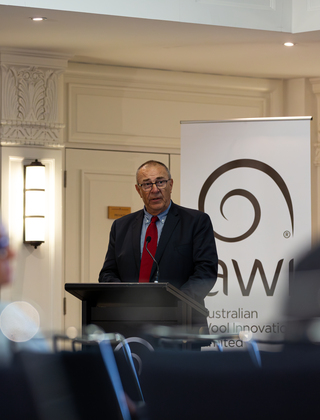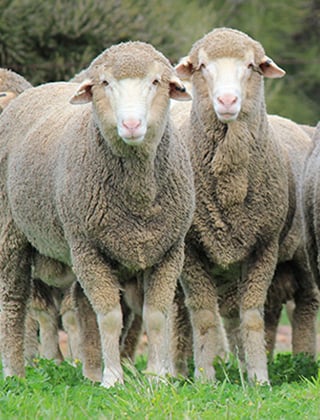Sock it to them, crookwell!
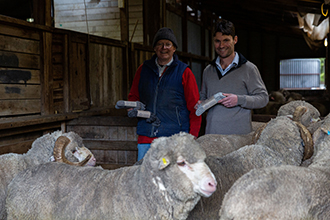
Family-owned Lindner Quality Socks, located in Crookwell on the Southern Tablelands of NSW, has a sock making heritage that can be traced back to the early eighteenth century in Germany. The company’s most popular socks are made from Merino wool, much of which is sourced from local woolgrowers.
Kenneth Wheelwright of ‘Roslyn Estate’ and Andrew Lindner of Lindner Quality Socks holding the Roslyn socks from Lindner’s Tablelands collection. The Wheelwrights are one of the local woolgrowers whose 18.5 micron wool is used in the Lindner Tablelands collection. The Roslyn socks are named after the locality in which the Wheelwrights’ property lies. PHOTO: Jay Lioz Photography
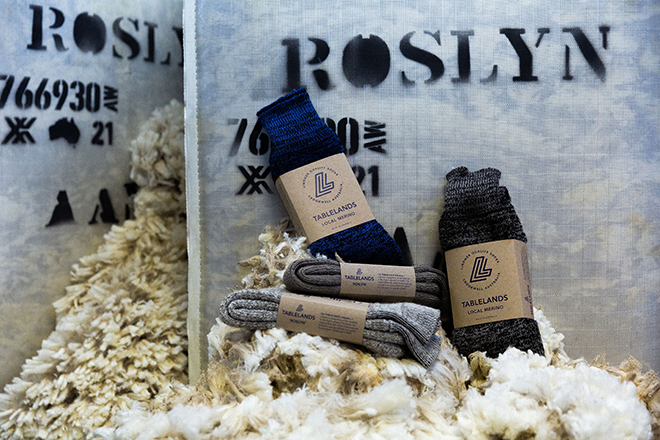
Family-owned Lindner Quality Socks, located in Crookwell on the Southern Tablelands of NSW, has a sock making heritage that can be traced back to the early eighteenth century in Germany. The company’s most popular socks are made from Merino wool, much of which is sourced from local woolgrowers.
The Lindner Quality Socks story started in the 1920s in Germany when Max Lindner set up a factory at Thalheim, a town in Saxony with a flourishing hosiery industry. However, a family line of Max’s father-in-law includes sock-knitters in every generation as far back as the 1730s.
By 1970, the company that Max Lindner founded had grown significantly and had even begun making socks under contract for adidas. In 1974, the West German football team won the soccer World Cup wearing adidas socks manufactured by Lindner. In the mid-1980s, the two brothers that owned the family business decided to split the company, with one of the brothers, Wilfred, moving his family and half of the Lindner machines to Australia to set up Lindner Quality Socks in Goulburn, NSW.
In 1997, the family moved 50km to a new home in Crookwell, taking the machines to a new factory and shopfront on the main street of the town. In this location, the great grandson of Max Lindner, Andrew, and Andrew’s mother Gisela, continue the family tradition of making quality socks.
“Our factory and shop have been a fixture in Crookwell for more than 20 years, and while we’re growing our business and selling globally online, Crookwell is and will remain our home. We love being a part of our community; we appreciate the connectedness, the support we receive, and the pace of life here,” said Andrew, who also owns a nearby 55-hectare property.
“We’re committed to giving back to the community, whether that’s shopping locally, volunteering with the Rural Fire Service and Landcare, donating to local grass-roots causes, or supporting local events; they’re all part of the fabric of rural life.”
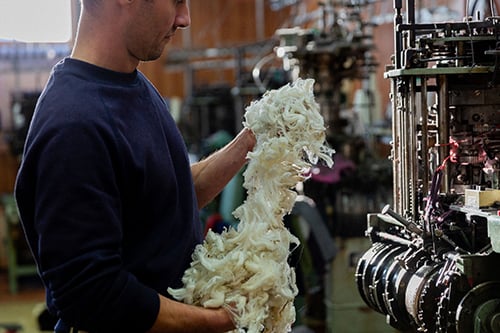
Andrew Lindner of Lindner Quality Socks in the Lindner factory at Crookwell, holding fleece grown by the Wheelwright Family of ‘Roslyn Estate’. PHOTO: Jay Lioz Photography
The Crookwell town and community have welcomed the family, with many of the locals proudly wearing their Lindner socks from the “Sock Shop” as they call it. Over the years, the shop and factory have become one of the town’s attractions for tourists and visitors, some of whom specifically travel to Crookwell to stock up on socks.
“People buy from us because they appreciate a quality product. At Lindner, we value the old skills and knowledge. We use traditional knitting machines that produce unique socks, and every sock is hand finished and checked for quality,” Andrew said.
“We love meeting and talking to our customers – and informing them about wool’s natural benefits and where it is sourced. Wool has a wonderful story which our customers really appreciate.”
MERINO WOOL SOCKS
Lindner produces a range of sock styles, from outdoors and casual/everyday styles to more formal fine-knit socks for dress shoes. Most of their socks include Merino wool.
While summers are warm and dry at Crookwell, winters are cold and wet, often with heavy frosts and sometimes snowfall. Working outdoors through these chilly winters, farmers and tradesmen on the Southern Tablelands have affectionately nicknamed Lindner’s popular Max Thick Full-Cushioned style of wool socks as “concrete socks” because the socks allow them to stand comfortably all day on cold, hard concrete without their feet getting sore, cold or tired. The socks are knitted using 22.5-micron Australian Merino wool. A knee-high version is popular with motorcyclists and skiers.
The company’s Tablelands Collection uses Merino wool grown locally by farmers on the Southern Tablelands. With a diameter of 18.5 micron, the wool fibres in the socks provide an extremely soft next-to-skin feel which makes them perfect as bed socks, but they also retain enough durability for wearing in work or hiking boots. The names of the sock styles are borrowed from localities around Crookwell and the Upper Lachlan Shire, to recognise the provenance of the Merino wool from which they are knitted, and the home of Lindner Quality Socks.
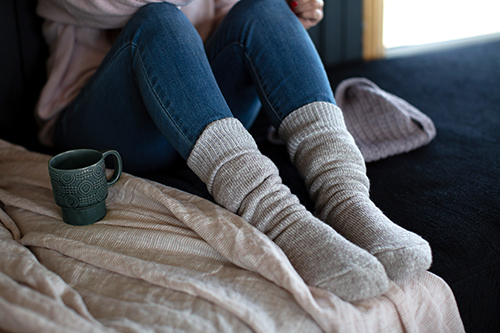
Laggan socks from the Lindner Luxury Collection, pictured at the Eldorado Cottage Airbnb at Laggan, NSW. PHOTO: It’s a Beautiful Life Photography
“Our most popular socks are our Merino wool range. In Crookwell, we are surrounded by many great breeders of Merino sheep and we have a passion for creating the best quality socks from some of the best Merino wool to be found anywhere,” Andrew said.
“The unique qualities of Merino wool make it ideal for socks and we encourage people to invest in well made, good quality Merino wool socks. While the use of a premium fibre such as Merino means the socks are not as cheap as mass produced cotton or nylon socks, the benefits of greater comfort and longer lasting socks mean your real cost may actually be less.”
The company also now stocks an ever-growing range of scarves, beanies and rugby style jumpers using the same Merino wool sourced from local woolgrowers.
More information: www.lindnersocks.com.au







